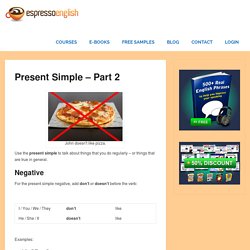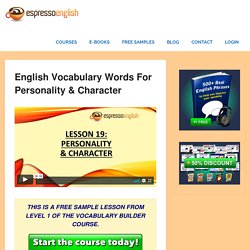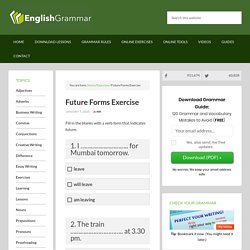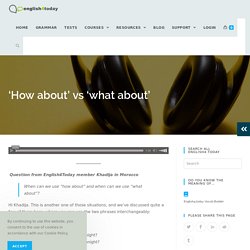

… Simple Past and Past Continuous - Present Simple – Part 2. John doesn't like pizza.

Use the present simple to talk about things that you do regularly – or things that are true in general. Negative For the present simple negative, add don’t or doesn’t before the verb: English Vocabulary Words for Personality & Character. This is a free sample lesson from Level 1 of the Vocabulary Builder Course.

There are many different aspects of personality and character, and we have many different words in English to describe them! Intelligence Let’s start with a person’s intelligence. A very common word to describe an intelligent person is smart. Common English collocations with the words big, great, large, deep, strong, and heavy. 1000 English Collocations E-Book Collocations are words that go together naturally in English.

In English, a collocation is two or more words that go together naturally. Learning collocations is essential for making your English sound fluent and natural! Here are 50 common English collocations with the words big, great, large, deep, strong, and heavy. English collocations with the word BIG. 'The Rapist Is YOU': Feminists Revolt Outside Harvey Weinstein's Trial. 10 English Words Ending in -LESS - First Conditional: When, As Soon As, Unless - BBC Learning English sur Twitter : "Do you have a minute to spare to learn some English? James is going to explain how to use try + -ing or to + verb. For a summary and quizzes, visit our website #learnenglish #grammar #vocab #ver.
Future Forms Exercise. Fill in the blanks with a verb form that indicates future. 1.

I ……………………….. for Mumbai tomorrow. Correct! Wrong! The present continuous is commonly used to talk about future events which have already been planned or decided. 2. The simple present is used to talk about time tabled future events. 3. We use the simple future to talk about future events which are not already decided. 4. 5. 6. 7. Food. Scallops can move fast when they want to □□… Nooooo, lo tiraron al agua, lo traicionaron. □ 'How about' vs 'what about' - English4Today. Question from English4Today member Khadija in Morocco When can we use “how about” and when can we use “what about”?

Hi Khadija. This is another one of those situations, and we’ve discussed quite a few of them here, where you can use the two phrases interchangeably: Both can be used to make suggestions. How about going to see a movie tonight? Or, in the case of a non-suggestive question: Is Mike going with you? So, use either and the earth won’t open up and swallow you! 5 Signs You’ve Been Doing Too Much for Too Long. A ce niveau-là, c'est de l'art… My heart □ "When a soccer player's hijab started falling off to reveal her hair, her opponents gathered around to provide cover while she fixed it.
… Greta Thunberg (@GretaThunberg) Feeling emotional watching the absolute sea of humanity at the #GlobalClimateStrike march in Toronto. So many young kids fighting back. Thank god they’re our next generation! #ThereIsNoPlanetB □ ❤️ . #climatechange #climatestrikecanada #canada #toronto #g. An estimated 250,000 people gathered in New York to hear Greta Thunberg speak. To wild cheers - followed by chants of "Greta! Greta!" - she told them: "We will make them hear us" Incredible pictures from all over Italy! This is Torino #ClimateStrike #FridaysForFuture… Handbooks For Language Teachers. Published 18 September 2019 40 years ago today, we published the first book in the Cambridge Handbooks for Language Teachers series.

To mark this anniversary, over the next few months we’ll be bringing you special content from our Handbook editors and authors. Today we start the celebrations with an exclusive interview with series editor Scott Thornbury. A brief history of Cambridge Handbooks for Language Teachers On 20 September 1979, Cambridge University Press published Games for Language Learning by Andrew Wright. Been overseen by world-renowned series editors Michael Swan, Roger Bowers, Penny Ur and Scott ThornburyFeatured books by over 60 expert authors including Jack C.
Perspectives on Cambridge Handbooks for Language Teachers, from current series editor Scott Thornbury Scott became the series editor in 2005. Watch the videos below to hear Scott’s unique perspective on the Handbooks and his time as series editor. How did you feel when you were approached to be the new series editor? An estimated 250,000 people gathered in New York to hear Greta Thunberg speak. To wild cheers - followed by chants of "Greta! Greta!" - she told them: "We will make them hear us"